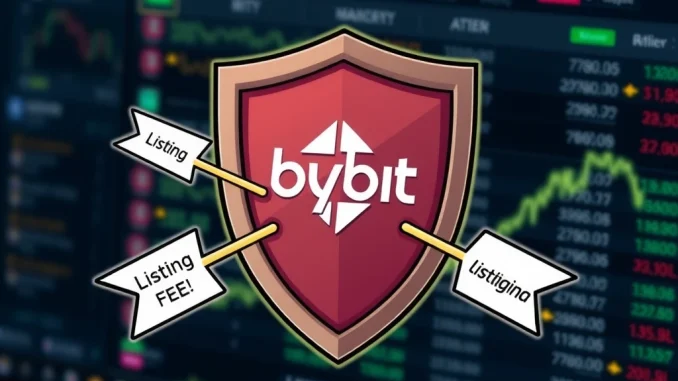
Is Bybit demanding a staggering $1.4 million just to list your favorite crypto tokens? Rumors have been swirling, fueled by an X user’s bold claims, but Bybit is stepping into the spotlight to set the record straight. Let’s dive into the heart of the matter and uncover the truth behind the Bybit listing fee controversy and what the exchange actually requires from projects seeking a coveted spot on their platform.
Decoding the Bybit Listing Fee Allegations
The crypto sphere is no stranger to whispers and speculation, and this time, Bybit, a prominent cryptocurrency exchange, found itself in the crosshairs. An X user ignited the debate by alleging a hefty $1.4 million listing fee. Such a figure, if true, would undoubtedly raise eyebrows and spark concerns within the crypto community. Imagine the impact on smaller, emerging projects striving for visibility! But is there any substance to these claims? Bybit has vehemently denied these accusations, stepping forward to clarify their project evaluation and listing process.
Bybit’s Official Response: Setting the Record Straight on Token Listing
In response to the swirling rumors, Bybit reached out to Cointelegraph to provide an official statement. They unequivocally denied the $1.4 million token listing fee allegation. Instead, Bybit outlined a structured approach that includes:
- Security Deposit: A mandatory security deposit ranging from $200,000 to $300,000 is required. This deposit serves as a safeguard and demonstrates the project’s commitment and seriousness.
- Promotional Budget: Projects are expected to allocate a budget for promotional activities. This is crucial for ensuring successful launch and gaining traction within the Bybit ecosystem. A strong promotional strategy benefits both the project and the exchange.
- Rigorous Evaluation Process: Bybit emphasizes a thorough evaluation process for all projects seeking listing. This includes assessing various factors such as project legitimacy, community support, technological soundness, and long-term viability. This process ensures that only quality projects are listed on the platform, benefiting users and maintaining the integrity of the exchange.
Essentially, Bybit is highlighting a multi-faceted approach that goes beyond a simple, exorbitant listing fee. It’s about ensuring project quality, security, and sustainable growth within their ecosystem.
Ben Zhou Steps In: Demanding Evidence and Transparency
Adding weight to Bybit’s official denial, CEO Ben Zhou directly addressed the allegations. He labeled the claims as “baseless” and challenged critics to provide concrete evidence to support their accusations. Zhou’s direct involvement underscores the seriousness with which Bybit is taking these allegations and their commitment to transparency and dispelling misinformation. His call for evidence puts the onus back on the accusers to substantiate their claims, moving the conversation towards factual information rather than unsubstantiated rumors.
Unanswered Questions: Addressing the Campus Ambassador Program
While Bybit has directly addressed the listing fee allegations, one area remains in the shadows – claims concerning the misuse of Bybit’s Campus Ambassador program. These claims, though not detailed in the provided content, warrant attention. Transparency and accountability are paramount in the crypto space. Addressing all concerns, not just the most prominent ones, is crucial for maintaining trust and fostering a healthy community. Further clarification from Bybit regarding the Campus Ambassador program would be a welcome step towards complete transparency.
Why This Matters: Implications for Crypto Projects and Exchanges
This situation highlights several key aspects of the cryptocurrency landscape:
- Transparency in Listing Processes: The crypto community demands clarity regarding how exchanges operate, particularly concerning listing fees and requirements. Open communication builds trust and allows projects to make informed decisions.
- Combating Misinformation: Rumors and unsubstantiated claims can spread rapidly in the digital age. It’s crucial for exchanges to proactively address misinformation and provide factual information to the community.
- Due Diligence for Projects: Projects seeking exchange listings must be prepared to undergo rigorous evaluation and meet specific requirements. This ensures quality and protects investors.
- The Role of Security Deposits and Promotional Budgets: These requirements, while adding to the initial cost, can be seen as necessary measures for ensuring project legitimacy and successful launch on a platform like Bybit.
Navigating the Crypto Exchange Landscape: Key Takeaways
In conclusion, the crypto allegations surrounding Bybit’s listing fees serve as a reminder of the importance of critical thinking and verifying information in the fast-paced world of cryptocurrencies. Bybit has actively refuted the $1.4 million claim and clarified their token listing process, emphasizing security deposits, promotional budgets, and rigorous evaluation. While questions about the Campus Ambassador program linger, Bybit’s direct response and CEO Ben Zhou’s involvement demonstrate a commitment to addressing concerns. For crypto projects aiming for exchange listings, understanding the nuances of each platform’s requirements and engaging in open communication is paramount. And for the crypto community, it’s a call to seek truth and demand transparency in this dynamic and evolving ecosystem.



